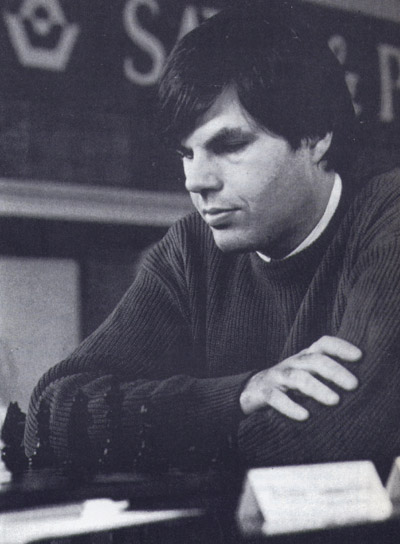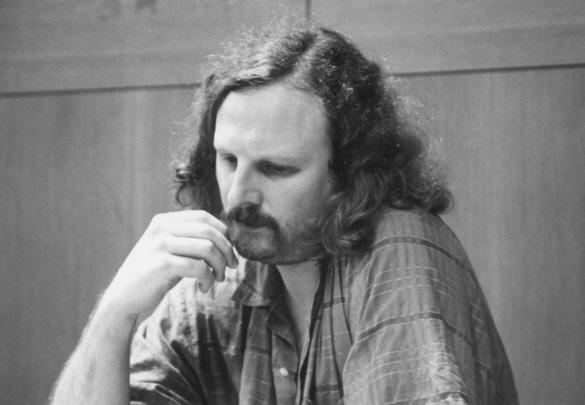
|
|
|
McKay v Miles
The Langs Supreme Challenge
Stakis Grosvenor Hotel, Glasgow
12th - 16th June 1983Background
The idea of this match surfaced at a committee meeting of the Cathcart Chess Club (Glasgow) executive in 1982. A discussion was taking place with regards to what the club might do to celebrate its 30th birthday, the club having been founded in 1953. It seemed natural to involve, if possible, the club's strongest player, and one of the strongest players in Scotland, Roddy McKay. It also seemd natural to think of Tony Miles, an International Grandmaster who had been steadily moving up the world rankings with his exceptional results.There were serious misgivings, quite naturally, about the viability of such a match, considering the low level of support for chess in general, and financial support in particular. Despite these negative aspects, there was enthusiasm for the idea from the late Alan Shaw, who saw the positive aspects. He offered to make some initial enquiries, and ended up shouldering most of the organisational responsibilities.
Alan had briefly worked for B.H. Wood and his publication CHESS, based in Sutton Coldfield, Birmingham. During his time there Alan had met Tony Miles and so, with nothing to lose, he telephoned Miles and put the suggestion to him. Miles replied that he was indeed interested, and with that the first hurdle was cleared, McKay already having given his support for the plan.

Roddy McKay (1988)
Good Fortune
Alan Shaw telephoned a few hotels in Glasgow city centre, seeking a venue for the match. There was at least one positive response, although the offered support was limited. Alan continued to contact other establishments, now directing his attention outside the city centre area.He struck a seam of good fortune when he contacted the Stakis Grosvenor Hotel and spoke with the manager, Tim Kelly. It turned out that Mr Kelly had, some years before when he worked in another hotel, hosted a chess match. His response to the idea of a McKay-Miles match was immediate, and very positive in regard to the level of support he was willing to offer.
Further discussions between Alan Shaw and Tim Kelly resulted in the hotel offering accommodation for Miles, a playing room for the match, an analysis room, as well as the banqueting room for a simultaneous display by Miles who, as a chess professional, hoped to have several such displays during his time in Scotland.
Not long after the initial agreement had been put in place with the Stakis Grosvenor, Mr Kelly contacted Alan Shaw with a proposal that virtually sealed the success of the match from an organisational and financial perspective. Tim Kelly had been discussing his hotel's involvement with the match with Langs Supreme Scotch Whisky, having worked with this company on previous events. Langs expressed a strong interest in being involved, partly because - another coincidence - their marketing and promotion staff had been involved with Tony Miles on a previous occasion. The financial support offered by Langs meant that Cathcart Chess Club could provide appropriate fees to both players; originally it was accepted that Miles would have to be paid a fee, while Roddy was willing to forego a fee, because he welcomed the opportunity to match his skills with the highly-rated Miles.
Additional fundraising
Roddy gave a simultaneous exhibition against members of Cathcart CC, something he did every year to raise general funds for the club. This time, the exhibition was to raise funds for the match. As an incentive, free places in the Miles simultaneous exhibition in Glasgow were offered to those who collected the most sponsorship money, or who lasted longest against Roddy. Club members responded enthusiastically, rasing around £230. Against 12 opponents in the exhibition, Roddy conceded only two draws.
Marketing and Promotion
There were several ideas that could be used with regard to the promotion of the match in the media. The strength of the players - Scotland's strongest player against a powerful International Grandmaster who would shortly appear in 18th position on the world rankings; Cathcart Chess Club's 30th anniversary; 50 years since the 1933 Fairhurst-Eliskases match in Glasgow, when the best player in Scotland faced the visiting Austrian master.Mention of the match was made in the chess columns of the Scotsman, Glasgow Herald, Sunday Standard and Guardian, among others. A press conference involving the television companies was arranged, but had to be cancelled when a national election was announced shortly before the start of the match.
The Glasgow Herald had a feature article by Colm Brogan in its issue of June 14th.
Front page of a promotional brochure.
Playing conditions
It was felt that the playing conditions could not have been bettered. The players were in a comfortable suite, with seating for a dozen spectators. Across the hall, Peter Jamieson played host in an analysis room, where the games could be discussed in-depth with the help of a demonstration board. Gerald Bonner and Ken Stewart acted as arbiters in what was for them, officially speaking, an uneventful match!The Games
It should be noted that right from the start McKay had asked that the game be rated. Miles agreed to this request.1st Game:
This was drawn in 51 moves. Miles, with the white pieces, held the initiative for most of the game but, as he later admitted, he 'chickened out' at one point, when the desire not to lose took precedence over the desire to win. He continued to push hard for the win, but Roddy defended well and Miles eventually took the draw by perpetual check. This aspect of of McKay's play - accurate defence - was not expected by Miles, who had of course been aware of Roddy's tactical ability.Miles - McKay [E32]
Glasgow (Match) (1), 19831.d4 Nf6 2.c4 e6 3.Nc3 Bb4 4.Qc2 0-0 5.Bg5 h6 6.Bh4 d6 7.e3 e5 8.Nf3 exd4 9.Nxd4 Nbd7 10.Be2 Ne5 11.0-0 Bxc3 12.Qxc3 Ng6 13.Bxf6 Qxf6 14.Nb5 Qe7 15.Qd4 Be6 16.Rad1 Rfd8 17.f4 a6 18.Nc3 c5 19.Qd3 b5 20.b3 bxc4 21.bxc4 f5 22.Rb1 Rab8 23.Rfd1 Rb4 24.Bf3 Kh8 25.Bd5 Rdb8 26.a3 Rxb1 27.Rxb1 Rxb1+ 28.Qxb1 Bg8 29.Qc1 Bxd5 30.Nxd5 Qe4 31.Kf2 Ne7 32.Nxe7 Qxe7 33.Qc2 Qh4+ 34.Kf1 Qf6 35.Ke2 Qg6 36.Kf2 Qf6 37.Qd3 Qh4+ 38.Kf1 Qf6 39.h3 h5 40.Qd1 h4 41.Kg1 Qc3 42.Kh2 Qxa3 43.Qh5+ Kg8 44.Qe8+ Kh7 45.Qh5+ Kg8 46.Qe8+ Kh7 47.Qe7 Qd3 48.Qxh4+ Kg8 49.Qe7 a5 50.Qe8+ Kh7 51.Qh5+ Kg8 ½-½
2nd Game:
Roddy pressed hard for the win, and it seems he he might indeed have won, but for a slip after the game had moved into the endgame phase.McKay - Miles [E12]
Glasgow (Match) (2), 1983
[Craig Pritchett from his column in the Glasgow Herald of June 18, 1983.]1.d4 Nf6 2.c4 e6 3.Nf3 b6 4.a3 Bb7 5.Nc3 d5 6.cxd5 Nxd5 7.e3 Be7 8.Bb5+ c6 9.Nxd5!? The usual move, 9.Bd3, retains more tension in the position and must be objectively better. However, this unusual exchange catches Black out in the tensions of over-the-board play. 9...exd5 10.Bd3 Nd7 11.Qc2 g6 12.0-0 c5?! Black opens the game prematurely. 12...0-0, and if 13.e4 dxe4 14.Bxe4 Nf6, seems to lead to easy equality. 13.b3 Rc8 14.dxc5 bxc5 15.e4 0-0 16.Bh6 Re8 17.Rad1 d4 18.Rfe1 Bd6 19.Bc4 Nb6 20.Bb5 Re6 21.Ng5 Re7 22.Qd3 a6?! White's pieces are extremely active, and 23. b4 threatens. In a difficult situation Black seeks salvation with a doubtful pawn sacrifice. 22...Be5, and if 23.Qh3 f6, may have been necessary. 23.Bxa6 Bxa6 24.Qxa6 Ra8 25.Qb5 Rb7 [25...Rxa3 26.e5! is dangerous, e.g. 26...Bxe5 27.Qxc5 Bd6 28.Qxd4 Rxe1+ 29.Rxe1 Bxh2+ 30.Kxh2 Qxd4 31.Re8#] 26.e5 Be7 27.Ne4 Qd5 28.Nf6+ Bxf6 29.exf6 Nd7 30.Rxd4! This move should probably win the game. 30...Rxb5 31.Rxd5 Nxf6 32.Rd6 Ne8 [32...Ng4 33.Bc1 and White holds on to the extra pawn. AMcG] 33.Rd7? However, short of time, White misses 33.Rd3, which simply consolidates his extra pawn. 33...Rxb3 34.h3 Ng7 35.Bxg7 Draw agreed. ½-½
3rd Game:
This game saw Miles play in powerful fashion throughout, gaining the only win of the match.Miles - McKay [E39]
Glasgow (Match) (3), 19831.d4 Nf6 2.c4 e6 3.Nc3 Bb4 4.Qc2 c5 5.dxc5 0-0 6.Bf4 Bxc5 7.e3 b6 8.Nf3 Bb7 9.Rd1 Nc6 10.Be2 Rc8 11.0-0 Be7 12.h3 Na5 13.b3 d5 14.Qb2 Bb4 15.Nb5 a6 16.a3 Be7 17.Nc3 Qe8 18.Ne5 Bd6 19.cxd5 exd5 20.Ng4 Be7 21.Be5 Nxg4 22.Bxg4 f5 23.Bf3 Bxa3 24.Qxa3 Qxe5 25.Nxd5 Rb8 26.Ne7+ Kf7 27.Rd7 Ke8 28.Rfd1 Bxf3 29.gxf3 Rf7 30.R1d5 Qe6 31.Qa4 Rxe7 32.R7d6+ b5 33.Qxa5 Qc8 34.Qd2 f4 35.Kg2 fxe3 36.fxe3 Rc7 37.Qd3 g6 38.Qd4 1-0
4th Game:
In the fourth and last game Roddy threw everything at his opponent in a sacrificial attack in an effort to equal the score. At the critical moment he took a draw by perpetual, though later analysis suggested that he could have won.McKay - Miles [E12]
Glasgow (Match) Glasgow (4), 19831.d4 Nf6 2.c4 e6 3.Nf3 b6 4.a3 Bb7 5.Nc3 d5 6.cxd5 Nxd5 7.e3 Be7 8.Bb5+ c6 9.Bd3 Nxc3 10.bxc3 c5 11.Qc2 Qc7 12.0-0 cxd4 13.exd4 Bxf3 14.gxf3 Nd7 15.f4 g6 16.d5 exd5 17.Re1 Nc5 18.Bb5+ Kf8 19.f5 g5 20.Qd1 Qd6 21.Qh5 h6 22.Rxe7 Qxe7 23.Be3 f6 24.Re1 Qf7 25.Qd1 Kg7 26.Bd4 Rhd8 27.Re3 a6 28.Be2 Qd7 29.Bh5 Qd6 30.Bg6 Ra7 31.Qh5 Qf4 32.Bh7 Ne4 33.Qg6+
Douglas Bryson suggested as winning 33.f3 (wrongly shown in Scottish Chess as a recommendation for move 34), which allows for the possible continuation 33...Kh8 34.fxe4 Rxh7 35.Bxf6+ Kg8 36.Re2 etc. However, as Douglas later pointed out, there is nothing wrong with what Roddy played here; it is a few moves later that a stronger possibility offered itself.
33...Kf8 34.Qg8+ Ke7 35.Qe6+ And here the game was agreed drawn. ½-½
IM Douglas Bryson points out that computer assistance shows that Roddy could have equalized the match by playing on:
After 35...Kf8 36.Rxe4! and the bishops dominate the rooks. 36...Qxe4 37.Qxf6+ Ke8 38.Qc6+ Rdd7 [If 38...Kf7 the difficult (for a human) 39.h3! has to be played to stop perpetual check. Black is still completely lost.] 39.Qc8+ Rd8 40.Bg6+ Rf7 41.Qe6+ which should be more than enough to win. ½-½
A win in such fashion would have been a fitting conclusion to a short, but well-fought match.
_________________________________________________
Simultaneous displays
Tony Miles gave six such displays during his stay in Scotland (the Glasgow display was held at the Stakis Grosvenor on Wednesday, June 15th).
Venue Ciba-Geigy CC Irvine Dundee Glasgow Grangemouth Aberdeen Miles - Noon,B [A46]
Glasgow (Simul), 19831.Nf3 d6 2.d4 Nf6 3.Bg5 Ne4 4.Bh4 c5 5.Nbd2 Qa5 6.c3 Nxd2 7.Qxd2 Bg4 8.e3 Nc6 9.Be2 g6 10.0-0 Bg7 11.a3 cxd4 12.exd4 Bxf3 13.Bxf3 Nxd4 14.Bxb7 Rb8 15.b4 Qh5 16.cxd4 Rxb7 17.Bg3 Qd5 18.Rac1 0-0 19.Rfd1 a5 20.bxa5 Ra8 21.Bf4 Rba7 22.Qe3 Qxa5 23.Rc3 Rc7 24.Rdc1 Rac8 25.Rxc7 Rxc7 26.Rxc7 Qxc7 27.h3 Qa7 28.d5 Bd4 29.Qd2 Bc5 30.Bg5 Qxa3 31.Kh2 Qa1 32.Qe2 Qe5+ 33.Qxe5 dxe5 34.Kg3 f5 35.Kf3 Kf7 36.Ke2 e4 37.h4 Ke8 38.f3 Kd7 39.fxe4 fxe4 40.Bf4 Bd4 41.Kd2 Bf2 42.Kc3 e6 43.dxe6+ Kxe6 44.h5 gxh5 45.Kc2 Kf5 46.Bc7 Be3 47.Kd1 Bf4 48.Bb6 Kg4 49.Bf2 e3 50.Be1 Bg3 51.Bb4 h4 52.Ke2 Bf2 53.Kf1 h5 54.Bd6 h3 55.gxh3+ Kf3 0-1
Additional note:
A few months after this match, Tim Kelly and the Stakis Grosvenor Hotel again offered their support of chess in Scotland, when they stepped in to offer accommodation to the members of the visiting Partizan Belgrade team in their match against Castlemilk Chess Club.
|
|
